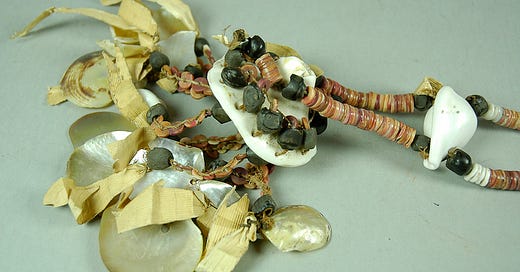Review: Mona Simpson on Lewis Hyde
Giving without expectation of return, remembering in order to forget
Image: Necklace of red shell discs with pendants of shell, seeds and palm fiber, which circulated in the “kula ring” first described for scholarship by Bronislaw Malinowski in 1922. The kula ring is a system of ceremonial exchange linking the Massim island communities off the northeast coast of New Guinea. Pitt Rivers Museum, Oxford, UK.
Lewis Hyde is the author of four books of nonfiction that are particularly hard to categorize. In his first one, The Gift, he uses folklore, contemporary studies of organ donation, Bronislaw Malinowski’s observations of the Massim peoples, the practices of Alcoholics Anonymous, and an account of one family in an impoverished neighborhood to contrast the economies of gift-giving with a marketplace. He concludes that gifts are “female” property; “social work and soul work” as he calls it, is not a commodity and would never be undertaken only for compensation (we note the low salaries of ministers, teachers, artists, and caregivers). “Writing a poem, raising a child, developing a new calculus, resolving a neurosis, invention in all forms,” these are labors people undertake as their own end. He refers to Emily Post’s list of people for whom we throw showers: brides, expectant mothers, the new clergyman in town. The new rabbi receives a casserole while the new CEO of a software application startup does not. Gift exchange, Hyde argues, engenders relationships, debts of gratitude, whereas the marketplace leaves the buyer and seller in “the perfect freedom of strangers.” He distinguishes between work driven by the will and work prompted by a call of the spirit, which he defines as “labor,” and notes that this kind of effort follows its own schedule. (Though eventually a professor at Kenyon and a MacArthur fellow, Hyde labored over The Gift for years while working odd jobs and teaching fourth graders.)
Keep reading with a 7-day free trial
Subscribe to Book Post to keep reading this post and get 7 days of free access to the full post archives.



